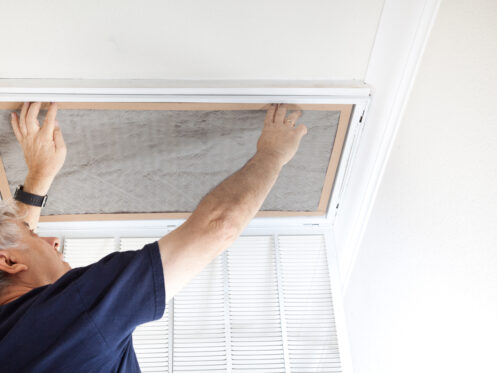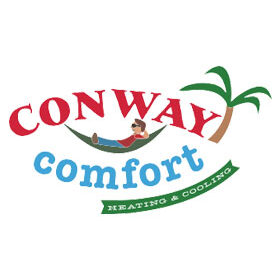As colder weather joins us for another year, your family is going to be spending more time indoors. While you may be thinking about filling up your fuel storage tank, that shouldn’t be your only concern. The quality of your indoor air can be much worse than the air outdoors. By implementing some of the tips that we’re going to go over below, you can easily work to enhance the quality of air inside your home for your whole family.
Change Your HVAC Filter
One of the biggest culprits of poor indoor air quality is a dirty air filter. The air filter inside your HVAC system is meant to trap unwanted airborne pollutants. These include particles like dust, pollen, and even pet dander. As your air filter traps an abundance of these particles and nears the end of its lifespan, it’s going to be more challenging for your heating system to pull air through the filter. This situation can lead to overall system inefficiency and cause more airborne contaminants to stay inside your air.
It’s a good idea to check the state of your air filter at least once a month. Hold it up to a light and see if you can see through it. If you can no longer see through the filter, you should know it’s time to replace it with a new one. You’ll need to replace it with a filter of the exact same size to ensure that it works correctly inside your heating system.
Upgrade HVAC Filters
Many homeowners don’t realize that there are different ratings for HVAC filters. These are called MERV ratings, and the higher the rating, the more capable the filter is of filtering out airborne contaminants. Filters can have a MERV rating of 1 to 20. While you might want to immediately jump to get a filter with a MERV rating of 20, you’ll want to think again.
It’s important to understand that the highest-rated filters will have smaller openings, which makes it much harder for your HVAC system to pull air through them. For this reason, most residential HVAC systems should have a filter with a MERV rating of between 8 and 12. Filters with a higher rating are only recommended for sterile environments, such as operating rooms, where the HVAC equipment can support the flow of air.
Consider a UV Sanitizing Light
UV sanitizing lights can be a great investment for homeowners who are looking to go the extra mile to increase their indoor air quality. By opting for either an air-sanitizing UV light that sits inside your ductwork or a coil-sanitizing light that sits above your evaporator coil, you can take advantage of the germicidal properties that UVC rays offer.
These lights emit UVC rays that are absorbed by bacteria, viruses, fungi, and other pathogens in your air. When this absorption takes place, the UVC rays will cause a molecular disruption in these airborne contaminants. This disruption will render them unable to reproduce and force them to die.
Opt for a Whole-Home Air Purifier
You may be familiar with a standalone air purifier for your home. But did you know that these units are available in a whole-home setup? Situated directly in your return ducting, these whole-home air purifiers work to actively remove dust, dirt, VOCs, and other airborne contaminants. The beauty of these systems is that they can remove airborne contaminants from the air throughout your entire home instead of just one room.
It’s vital to note that there are a couple of different types of air purifiers that you can invest in. Flat or extended filters are probably one of the most common on the market today. These purifiers use a combination of activated charcoal and HEPA filters to remove a wide variety of contaminants and odors from your indoor air. You’ll need to change out these filters every few months.
Electronic filters are more of a high-tech option that comes at a much higher cost. These filters emit high voltage electrical current that puts a charge into the particles passing through your ducting. Right after the current, there are collector plates that attract the charged airborne particles to prevent them from flowing back into your home. You’ll need to clean the collector plates every few months for them to remain effective.
Consider a Whole-Home Air Scrubber
A whole-home air scrubber goes a step beyond your basic air purification system. This scrubber gets installed directly into your ductwork. As air passes through it, UV light technology distorts the DNA of harmful airborne contaminants. This distortion, essentially, allows you to kill off the contaminants instead of just trapping them, as you would with a typical filter.
Instead of just filtering the air that runs through your ducting, an air scrubber will send out air cleaners to be dispersed throughout your home. It does this by negatively charging ions in the air. These negatively charged ions are released into the various rooms of your home via your ducting. Since airborne contaminants are positively charged, the negatively charged ions will attract these contaminants.
This will essentially cause the contaminant to become heavier and drop out of the air. As your ventilation system operates, it will pull some of these particles into your ducts to be further distorted. In other cases, the heavy particles will fall to the floor and other surfaces throughout your home so that they can be easily cleaned. With fewer airborne particles floating around your home, your air will be of much better quality.
Invest in Duct Cleaning
Undoubtedly, over time, dirt and other debris are going to build up inside your ducting. This will not only decrease the quality of air inside your rooms but also make it more difficult for your heating system to circulate air throughout your home. Enlisting the help of a professional duct cleaning service can be a great way to remove excess debris from your ductwork.
A Note on Whole-Home Humidifiers
While whole-home humidifiers don’t actively clean the air inside your home, they do provide a wealth of related benefits during the winter months. Many people suffer from irritation in their throat and lungs throughout the cold months. This is the result of breathing dry air, as humidity levels dip in the winter. A whole-home humidifier can help ensure the humidity level inside your home remains at a comfortable level.
This will help guarantee that you can breathe easier and experience less frequent itching, dry eyes, and irritations. Furthermore, it’s useful to note that dry air is much less effective at holding heat in. When you increase the humidity level inside your home when it’s extremely low, you’ll notice that your home will stay warmer without using as much energy to do so.
Expert Indoor Air Quality Services
Conway Comfort Heating & Cooling provides expert indoor air quality services to the entire Hamilton Township, NJ and the surrounding areas. We can also assist with all of your heating, cooling, and commercial needs. Call us today to schedule an appointment.





